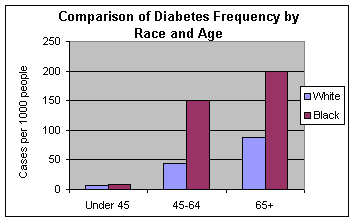Diabetes and African Americans
In 1998, 2.3 million African American adults over 20 had diabetes. In other words, 10.8% of the African American population had diabetes. African American adults are about 1.7 times as likely to get diabetes as white adults, whose rate of diabetes was 7.8% of the population in 1998.1
As the following graph shows, middle-aged and older adults are most commonly affected by diabetes. Within the middle-aged group, African Americans are more than three times as likely to have diabetes as white adults.

Source: Vital and Health Statistics, Series 10, Number 200, p. 85
In addition, African American women are more likely than African American men to have diabetes.2 About one-third of total diabetes cases are undiagnosed among African Americans. This proportion is similar for other racial/ethnic groups in the United States.3
Why Does Diabetes Affect More African Americans than Whites?
There are no definite answers as to why so many more African Americans have diabetes than whites. However, being overweight is a known cause of Type 2 diabetes. Most African Americans with diabetes have Type 2, which develops in adulthood and requires treatment with some combination of exercise, proper diet, medication and injected insulin. African Americans, and especially African American women, are more likely to be overweight than white Americans.4 African Americans are also more likely to carry their fat above the waist, which increases their risk of diabetes.5 Click here for nutrition recommendations for people with diabetes.
It appears that those who have type 2 diabetes might carry a diabetes gene that is passed down within families. Some researchers believe that African Americans inherited a “thrifty gene” from their African ancestors. Such a gene might have initially enabled Africans to use energy more efficiently when food was scarce. The theory is that today, without “feast and famine” cycles, the thrifty gene may make African Americans more likely to develop type 2 diabetes.5
Fewer African American children develop type 1 diabetes (also known as juvenile onset diabetes) than white children. In this case, genetics appears to be working favorably on the side of African Americans.
Be sure to look into testing for diabetes if you or a friend or relative are:
- Overweight, regardless of age,
- Do little in the way of physical activity, and
- Have diabetes in your family.
Some ways to help prevent type 2 diabetes, and the associated complications, include:
- Exercising
- Giving up cigarette smoking
- Reducing high cholesterol
- Reducing high blood pressure
- Keeping a healthy weight
References
1 Centers for Disease Control and Prevention. National Diabetes Fact Sheet: National estimates and general information on diabetes in the United States. Revised edition. Atlanta, GA: U.S. Department of Health and Human Services, Centers for Disease Control and Prevention, 1998 .
2 Centers for Disease Control and Prevention, National Center for Health Statistics, Division of Health Interview Statistics, data from the National Health Interview Survey. U.S. Bureau of the Census, 1999 (http://www.cdc.gov/features/dsdiabetestrends/).
3 Harris MI, Flegal KM, Cowie CC, et al. Prevalence of Diabetes, Impaired Fasting Glucose, and Impaired Glucose Tolerance in U.S. Adults: The Third National Health and Nutrition Examination Survey, 1988-94. Diabetes Care Vol. 21, 1998.
4 Centers for Disease Control and Prevention, National Center for Health Statistics, Division of Health Examination Statistics. Unpublished data, (http://www.cdc.gov/nchs/fastats/overwt.htm).
5 National Diabetes Information Clearinghouse, “Diabetes in African Americans,” (http://diabetes.niddk.nih.gov/dm/pubs/africanamerican/index.htm).
6 Gu K, Cowie CC, Harris MI: Mortality in adults with and without diabetes in a national cohort of the US population, 1971-93. Diabetes Care, vol. 21, 1998.
7 Harris MI, Klein R, Cowie CC, Rowland M, Byrd-Holt DD: Is the risk of diabetic retinopathy greater in non-Hispanic African Americans and Mexican Americans than in non-Hispanic whites with type 2 diabetes: a US population study. Diabetes Care, vol. 21, 1998.
A racially diverse, volunteer panel of health and other professionals from throughout Ohio reviewed this document. Panel members offer their perspectives on NetWellness content developed for African Americans prior to posting.
For more information:
Go to the African American Health health topic.